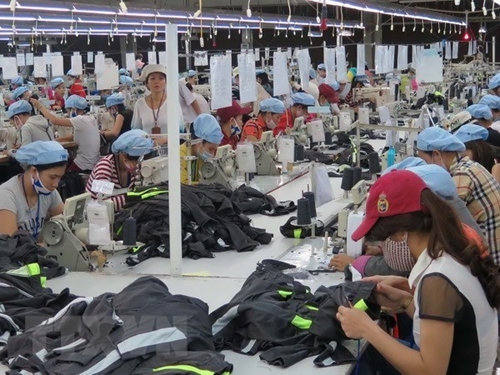The CPTPP gathers 11 economies, namely Canada, Australia, Brunei, Chile, Japan, Malaysia, Mexico, New Zealand, Peru, Singapore and Vietnam.
Its enforcement is the latest demonstration of trade liberalization in Asia-Pacific, experts have said, noting that Japan and Singapore recently signed bilateral free trade agreements (FTAs) with the European Union. An FTA between Vietnam and the EU is hoped to be signed in the near future, while Australia, Indonesia and New Zealand are also negotiating similar deals with the EU.
    |
 |
|
Vietnam is expected to gain immediate trade benefits from the CPTPP |
The CPTPP will eliminate 95 percent of tariffs among member countries, and Vietnam has opportunities to gain immediate trade benefits from it, especially in the textile-garment and footwear industries – two of the country’s biggest foreign currency earners.
CEO of HSBC Vietnam Pham Hong Hai said in the context of trade tensions, the CPTPP reflects the Vietnamese Government’s determination to boost trade liberalization and build a rules-based trading system.
He expressed his belief that businesses will benefit from access to 500 million consumers and regulations on transparency.
The CPTPP will not only promote trade among its members – their exports are predicted to rise by more 6 percent collectively, with 8 percent for Vietnam, by 2030 – but also lead to shifts in global supply chains when trade flows move towards member countries.
According to an HSBC Navigator survey, about 39 percent of enterprises in the CPTPP members believe the agreement will directly or indirectly support their business activities in both the short and long terms.
Chairman of the Vietnam Chamber of Commerce and Industry Vu Tien Loc said thanks to the CPTPP, markets for Vietnamese firms will be expanded when most tariff barriers are removed. They will have chances to bolster exports, especially in products of Vietnam’s strength like textile-garment, footwear, handbags, and electronic, aquatic and agricultural products, to other member economies.
Local companies will also have more opportunities to diversify partners, mobilize resources, attract investment capital, import high-tech equipment, and join global value chains.
He added that the commitments under the CPTPP will generate a driving force for economic institutional reforms, thus creating a better environment for businesses.
Source: VNA